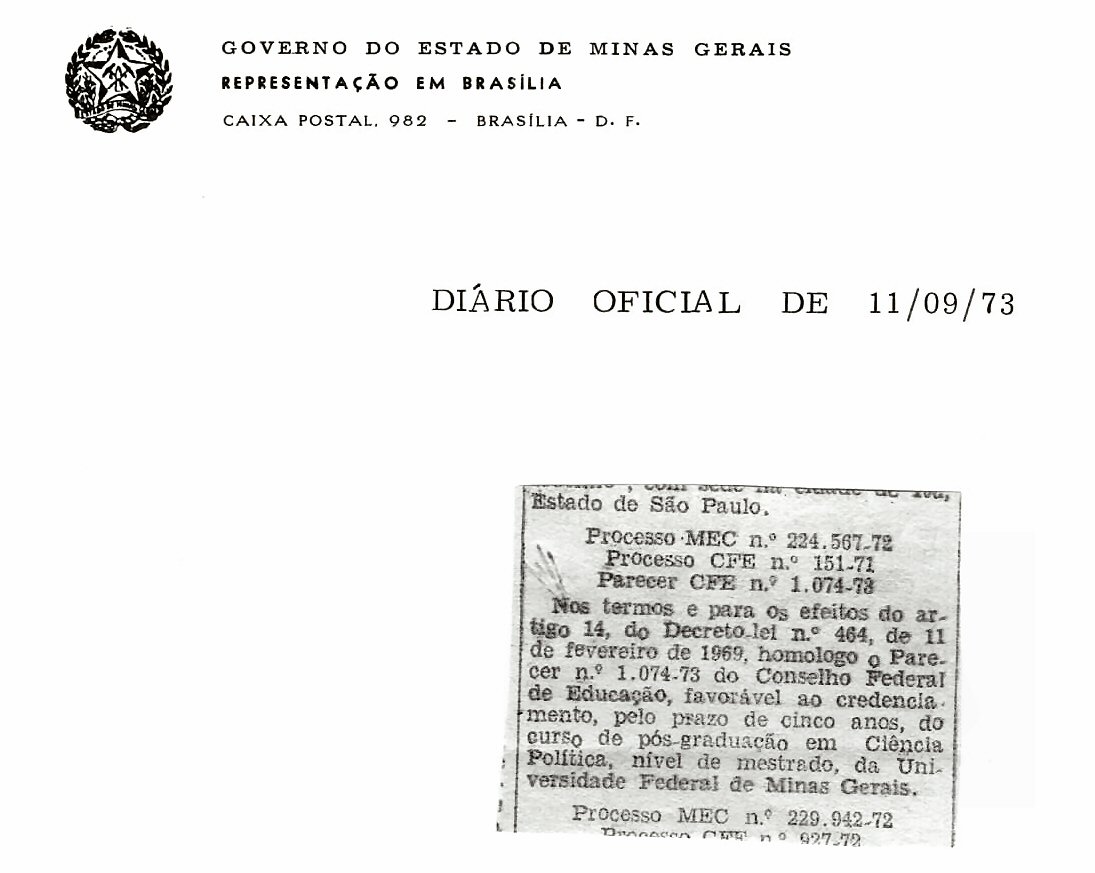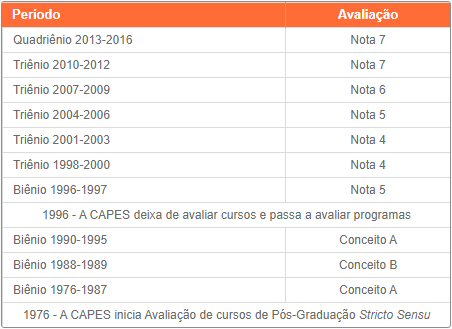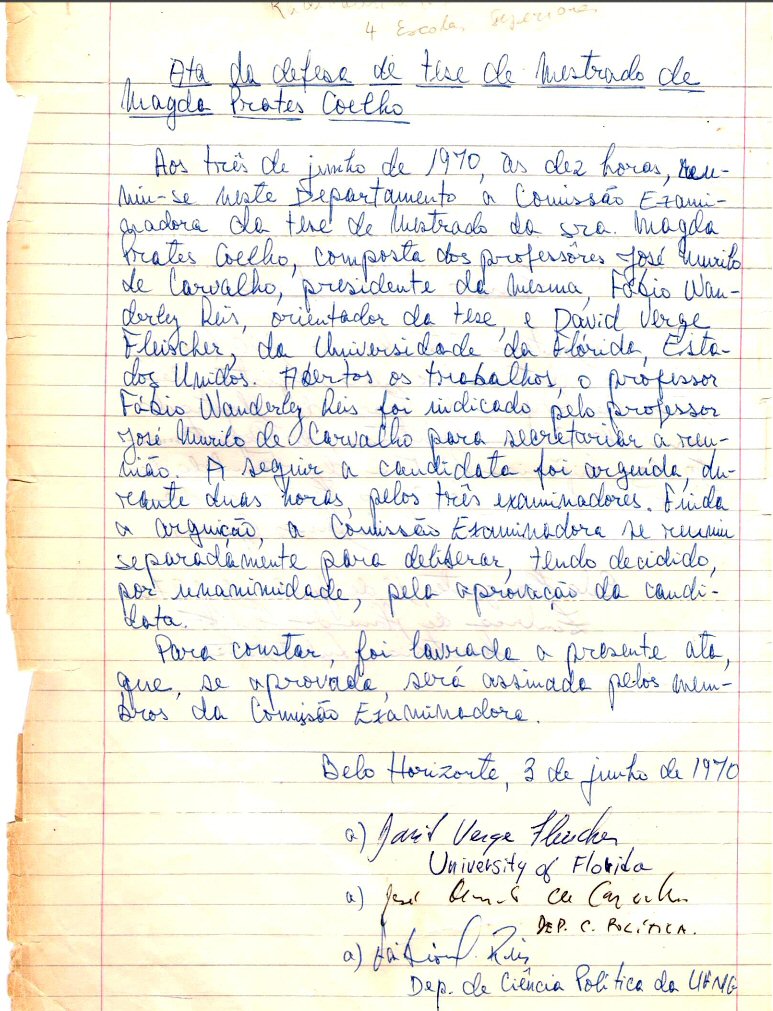Presentation
CAPES Evaluation | Objectives | Instruction | Research | Internationalization | Social Insertion
Brief history and structure
The Graduate Program in Political Science (PPGCP) at the Federal University of Minas Gerais (UFMG), Brazil, is the oldest in the country. Resolution 11, which implements and regulates the Department of Political Science, was established on December 6th, 1965, and it determines that the Department 'aims to provide courses focused on Master's and PhD degrees, as well as conducting research in Political Science and in related areas'. Having itself institutionally organized during 1966, the Department received the first class of its Master's Degree Program in March 1967. Registration at CAPES took place in 1969, although the effective accreditation dates from September 11th, 1973, when it was published in the Official Gazette.

Official Gazette's letter on the creation of the PPGCP, on 09/11/1973
PPGCP Today
As of today, the PPGCP-UFMG now offers excellence Master's and PhD training recognized by Capes. The program has made an important contribution to the scientific production of Brazilian Political Science, standing out for its insertion in international networks, for its plural research agenda, and for its centrality in the debates on Brazilian Political Science. It is pioneer in the construction of its own knowledge field, as the Program has enabled the training of part of the faculty and has established graduates into institutions spread out across the country.
The Master's experience naturally enabled the structuring of a PhD training in Human Sciences, approved in 1994, and based on a partnership between the Sociology and Political Science departments. The course was consolidated, and then twelve years later it was divided between the two areas that had accommodated it. The PhD training in Political Science initiated by the Department of Political Science began in 2005. This movement reflects a disciplinary focus and a process of institutionalization within the scope of the postgraduate training system.
The PPGCP-UFMG faculty currently has 17 professors. With strong research performance, this faculty is responsible for 17 different research centers and have demonstrated an upward trajectory in the quality of its scientific production.

50th anniversary commemorative photo of the PPGCP
CAPES Evaluation
Placed in a temporal perspective, the PPGCP-UFMG's trajectory shows a history of systematic and consistent expansion built on a solid base of experience in training and research. CAPES started the process of grading strictu sensu graduate training in 1976. Between 1976 and 1995, the Master's training obtained mostly the Concept A (the only exception occurred in the 1988-89 biennium, when the Program got a B), being therefore recognized as a center of excellence. From 1996 onwards, CAPES began to grade the programs and not just the courses. In its first biennium, PPGCP obtained Grade 5, which was the maximum rating for a program which did not have its own doctorate degree. There was a drop in this evaluation in the 1998-2000 triennium, which was felt in practically all ten programs in the area at that time. However, since then there has been a solid and steady rise, with the PPGCP attaining a Grade 5 in the 2004-2006 triennium, and a Grade 6 in the following one (2007-2009). The movement generated by this progressive expansion culminated on the receiving of a Grade 7 (maximum grade) in the following triennium (2010 to 2012) and its maintenance in the following four-year period (2013-2016). Such consolidation confirms the effort made to expand the Program's internationalization actions, which can be observed in collaborative research projects, in student and faculty exchanges, and in events and courses of international projection, as well as in the growth in publications in foreign journals.

Objectives
The main objective of PPGCP-UFMG is to be a center of academic excellence in Political Science, promoting 1) cutting-edge research aimed at including the program' internationalization, 2) education and training of highly qualified Masters' and PhD students, in addition to 3) being an interface between the state and society. Therefore, it carries more specific objectives, such as:
- Encouraging and facilitating the execution of Political Science research, promoting the production of innovative and relevant knowledge.
- Providing excellence in Political Science training.
- Promoting national and international academic cooperation, stimulating the formation of collaborative networks for knowledge production.
- Contributing to strengthening postgraduate programs in Political Science in Brazil through solidarity and nucleated actions, as well as constant work with research agencies and events in the area.
- Contributing to strengthening higher education at the UFMG.
- Promoting interfaces between academia, the State, and society, generating knowledge in order to contribute with, develop, and evaluate public policies, as well as thinking about social problems through various instruments.
- Protecting the ethical principles of Humanities' research.
Instruction

Minute of the 1st PPGCP's dissertation defense
Since its creation, the PPGCP-UFMG has graduated 500 Masters in Political Science, with the first Master's dissertations defended in 1970. The PhD in Human Sciences, in partnership with the Department of Sociology, graduated 54 PhDs between 1994 and 2005. Of these, 21 were supervised by Political Science professors. Another 184 PhDs received their degrees within the scope of the training in Political Science created in 2005. Thus, we currently have 205 Doctors with degrees.
The graph below helps to understand the PPGCP-UFMG journey, showing the dissertations defended in red, the Human Sciences PhDs in green and the Political Science PhDs in blue, with an evident increase in numbers over time.

Number of Defenses per year
Research
The PPGCP-UFMG is organized within a single concentration area, which is Political Science itself, and 5 (five) lines of research, namely:
1) State, Management, and Public Policies;
2) Political Institutions and International Politics;
3) Political Behavior and Public Opinion;
4) Participation, Social Movements, and Democratic Innovations;
5) Theories of Justice, Feminism, and Brazilian Political Thought.
The research lines aim at ensuring the density and plurality that historically characterize the PPGCP/UFMG.
It is in the scope of these lines of research that the Program's intellectual production takes place within the research centers.
The aforementioned research lines (1), (2), and (3) are anchored in the Program's tradition of studying institutions of representative democracy and the relations established between such institutions and society - an effort that involves historic PPGCP/UFMG's partnerships, such as the cooperation with the Universidad de Salamanca (ES) and the German Institute of Global and Area Studies (GIGA). In this broad axis, it is worth mentioning the growth, within the program, of expertise in the theme of public policies (Line 1), and the strengthening of the expertise in the theme of International Policy (which is part of Line 2). Line 1 involves the Publicus (Center for Studies in Management and Public Policies) and the Interinstitutional Center for Social Policy Analysis (CIAPSoc). Line 2 includes the Center for Legislative Studies (CEL) and the Interinstitutional Research Network on Foreign Policy and Political Regime (Ripperp). Line 3 includes the Public Opinion, Political Marketing, and Electoral Behavior Research Group and the Center for the Study of Political Behavior (Cecomp).
Lines (4) and (5) are located within the field of thematically-oriented proposals with a strong interdisciplinary emphasis, seeking to understand contemporary processes, experiments and struggles aimed at expanding democracy's definitions and practice. Line (4) involves the Participatory Democracy Project (Prodep), the Center for Studies in Deliberative Democracy (CEDE), the Center for Research in Politics and Internet (CePPI), and the Research Group in Democracy and Justice (Margem). Line (5) includes the Center for Studies and Research on Women (Nepem), and the Center for Brazilian Republican Studies (Cerbras), as well as Margem, which is also identified within this line. The insertion of research groups within the lines is obviously not too rigid and there are several crossing points between them.
In addition to the aforementioned groups, the PPGCP-UFMG has another two methodological groups: the Research Group on Methodology in Social Sciences and the Interdisciplinary Group on Methodologies in Public Policy Evaluation (GIMAPP), reaffirming what has been a tradition of the program since its inception.
The evaluation report of the last four-year period indicated the PPGCP-UFMG faculty as one of the most productive in the country, located in the upper quartile in both the production of articles and in the production of books and chapters. Furthermore, it is noted that given the diversification and consolidation of lines and research centers, the production is well distributed among the different faculty members. The program's internationalization is quite consolidated, which can be seen from indicators such as cooperation with several universities and international organizations in joint research projects, by student and faculty exchanges in international research networks, attracting students for joint doctorates, as well as individual and collective publications in international journals.
Internationalization
Internationalization is a driving force behind the PPGCP-UFMG's actions. The expansion and consolidation of the Program's international insertion involves constant investment. Efforts toward this are made on several fronts, including: establishing cooperation and partnership agreements, focusing on the development of joint research projects; encouraging the publication of articles in international journals and the presentation of research projects at international events; promoting seminars on political science, which have enabled intense and productive exchanges with leading researchers in several areas of political science. The invited researchers have engaged in several activities of the Program in addition to presenting lectures. Many of them dedicate to interacting with students and faculty members on their research projects. It is worth mentioning that the PPGCP-UFMG's student body has a wide history of exchanges with international educational institutions, not only through participation in events, but above all through longer internships in foreign institutions. Another internationalization front is revealed in the attempt to attract foreign students to the Program. This front involves both encouraging professors to attract students in their research networks, as well as joining programs specifically aimed at selecting foreign students, such as the PEC-PG and the PAEP OAS GCUB Program. This front is also related to the institutional presence of teachers in international academic networks, associations, and forums. Finally, it is worth mentioning that at least two faculty members work abroad as visiting scholars every year. Our professors have worked as visitors in the following institutions in the past few years: the University of Pennsylvania (USA), Universidade de Salamanca (Spain), University of Westminster (UK), European University Institute, EUI (Italy), Massachusetts Institute Of Technology, M.I.T. (USA), University of Oxford (UK), Universidad Rey Juan Carlos (URJC) (Spain), University of California Irvine (UCI), University of Canberra (Australia), University of Pittsburgh (USA), German Institute of Global and Area Studies (Germany), Université Catholique de Louvain (Louvain-la-Neuve e Mons, Belgium), Observer Research Foundation (New Delhi, India), Tulane University (USA), University of Massachusetts (USA), Universidade de Coimbra (Portugal).
Social Insertion
The social insertion of the PPGCP-UFMG is based on four main axes:
The Program has a central role in training qualified personnel for both academia and general public administration. It has the capacity to train personnel who are placed in universities all over Brazil, as well as in public and private institutions and agencies. There are also researchers among the graduates of the Program who are teaching and researching at foreign universities, such as Copenhagen Business School. In addition, researchers trained in PPGCP-UFMG work in various bodies at the local, state and federal levels, private companies, and municipalities, among others, such as: the Legislative Assembly of the State of Minas Gerais, Belo Horizonte City Federal Deputies Council, private entities such as CP2 Consulting, Research, and Planning, the National School of Public Administration, the Government of the State of Minas Gerais, the Inhotim Cultural Institute, the IPEA, the Estado de Minas Newspaper, the Public Health Education Center - Faculty of Medicine/UFMG, the United Nations Development Program (IPC-IG/UNDP), the Education Department of the Municipality of Contagem (MG), the Military Court of Minas Gerais, the Regional Electoral Court of Minas Gerais, the TRE-MG, and the Vox Populi and Quaest. Furthermore, in international organizations and NGOs such as the International Policy Center for Inclusive Growth, Women in Informal Employment Globalizing and Organizing (Cambridge, USA) and the International Anti-Corruption Academy (Austria).
The extension projects developed by professors linked to the PPGCP-UFMG enable the application of very concrete knowledge developed in research for interventions in social problems. Several of the Program's research groups such as Prodep, Nepem, Publicus, and the Public Opinion, Political Marketing and Electoral Behavior Research Group have a long tradition of organizing outreach projects Also worthy of mention are the activities aimed at the Education and Popularization of Science and Technology. PPGCP-UFMG has a long history of acting in the translation of scientific knowledge for interpreting contemporary situations. Finally, it should be noted that the program holds a series of academic events which have a strong interface with contemporary social problems, not only targeting an audience of researchers and students, but also of social movements, public managers, and citizens interested in given themes.



